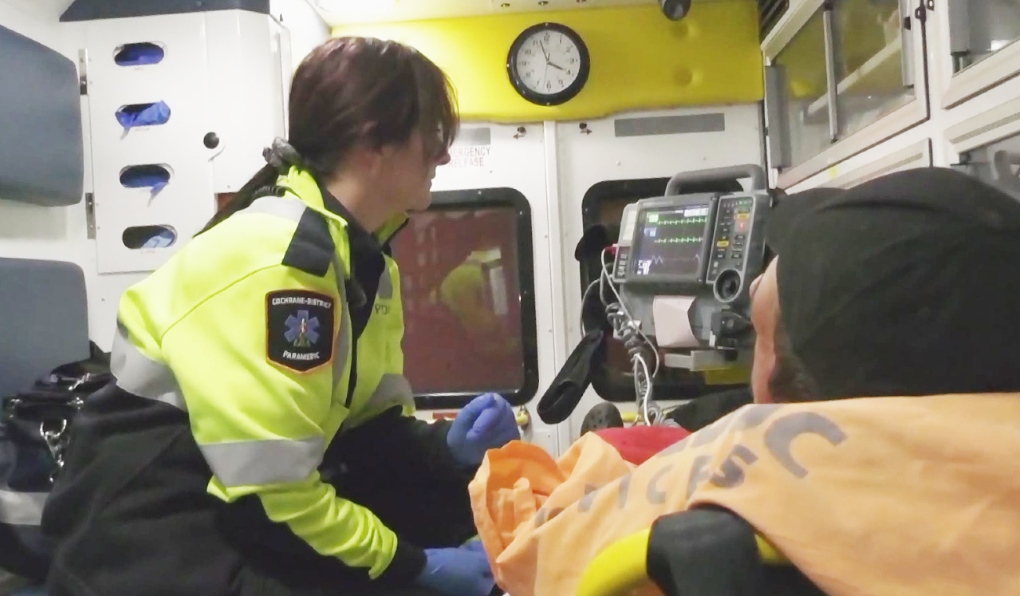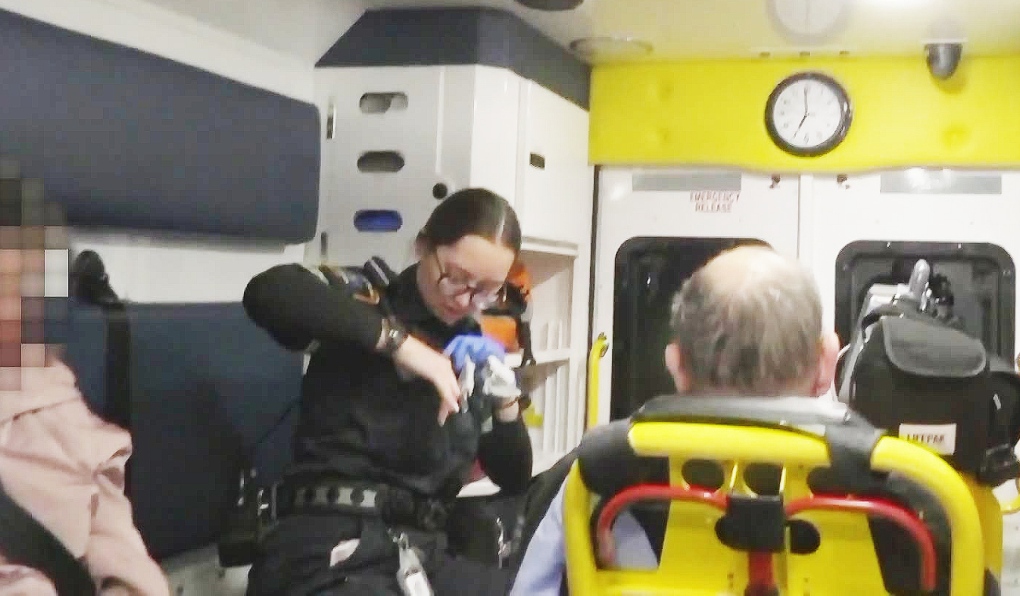Paramedics in Timmins see the drug crisis from the frontlines
In our series, Taking Back Timmins, we've been looking at the issues facing the city and the people tasked with trying to make the city safer.
That includes the vital role played by local paramedics, who rush to drug and trauma calls that have become too common in recent years.
Paramedics are critical frontline workers who ensure medical emergencies are treated quickly and claim as few lives as possible.
In recent years, their toolkits have grown.
“People don’t realize that the skills our paramedics have — our frontline paramedics, the ones that are working tonight — the skills that they have,” said Derrick Cremin of Cochrane District EMS
“Which includes the drugs they can administer, all the various equipment and the advancement in our career.”
Cremin said paramedics can diagnose and intervene in certain medical issues and keep patients stable until they reach the hospital.
 Tonight in our series Taking Back Timmins, we look at the vital role played by local paramedics, who rush to drug and trauma calls that have become too common in recent years. (Photo from video)
Tonight in our series Taking Back Timmins, we look at the vital role played by local paramedics, who rush to drug and trauma calls that have become too common in recent years. (Photo from video)
Alcohol-related calls are among the most common, but opioids continue to be one of the largest issues in the city.
Toxic supplies are suspected to have claimed around 28 lives in the district so far this year, most of them in Timmins. The difference now is that paramedics can help.
“Before, with overdoses, we weren’t really able to do anything and we weren’t really able to help them,” Cremin said.
“However, now we have Naloxone, where we can administer it for someone who’s had an opiate overdose. We have Suboxone, now, we’re the first service in Canada that was doing the Suboxone directive. Now, we’re seeing that, with these patients, we’re able to help them and our frontline paramedics are able to make a huge difference.”
A temporary safe consumption site has reduced the strain on EMS, but this year has seen more than 200 opioid-poisoning calls.
- Download our app to get local alerts on your device
- Get the latest local updates right to your inbox
And people are relying on district paramedics more, with just under 12,000 calls this year, a number that has grown by more than 24 per cent in just five years. And the emergencies are changing.
“There’s a lot more complex calls, there’s a lot more difficulty with calls,” Cremin said.
“Could be a complex medical call, could be a complex trauma call. It could be a medical call … it could be a safety call. They’re going to somewhere, where their life might be in jeopardy or somebody else’s life.”
 Tonight in our series Taking Back Timmins, we look at the vital role played by local paramedics, who rush to drug and trauma calls that have become too common in recent years. (Photo from video)
Tonight in our series Taking Back Timmins, we look at the vital role played by local paramedics, who rush to drug and trauma calls that have become too common in recent years. (Photo from video)
Violence is also one of the top urban issues right now in Timmins. The number of violent crimes is dropping by the year, but it still ranks in the province’s Top 10 and the country’s Top 80 when it comes to the most violent cities.
Paramedics deal with the results first-hand.
“Our paramedics are seeing things that you would’ve never seen 10 years ago, five years ago,” Cremin said.
“I think it’s just everywhere -- every paramedic service is seeing the same thing.”
On this evening, three homeless men were beaten at around 2 a.m., near where they had chosen to sleep for the night. Police arrested two suspects and were still searching for another.
Officials at the scene suspected other transients were trying to steal some of their possessions.
This is hardly the worst incident these professionals have encountered, but they say that doesn’t make it any less difficult to cope with -- especially dealing with patients living through some of the worst moments of their lives.
PSYCHOLOGICAL TOLL
Cremin said the psychological toll of the job has certainly increased, but there’s more help now.
“Our service has peer support, great support for all of our staff,” he said.
“There’s also the employee assistance program and what I’ve found, in the last few years, is there’s that connection being made, whereas before there wasn’t.”
Cremin said paramedics always wish they could do more to tackle issues like homelessness and drug addiction.
They offer access to resources when possible, but where Cochrane EMS was able to show the country’s paramedics a new way to treat overdoses in the field, Cremin said the service is also learning from others.
“The homelessness and the opioid epidemic is everywhere,” he said.
“It’s not just unique to Timmins and I think we’re doing a great job, and I can see, in the future, where maybe we’ll be more involved … with those resources.”
'I LOVE HELPING PEOPLE'
Cremin said he couldn’t have imagined paramedicine would change this much when he first started in 1999. It’s more difficult in some ways, but he said that just makes the work all the more rewarding.
“I just love helping people,” he said.
“I love making a difference and seeing the smiles on some of our patients’ faces. We’re actually able to follow up with patients -- some of our patients are following up with us. Before, we never knew what happened but now we’re getting that closure and, again, I think a lot of it has to do with we have an amazing group of paramedics, frontline paramedics and all of our staff at this Cochrane District Paramedic Service.”
Now Cremin said he’s as determined as ever to help Timmins heal.
CTVNews.ca Top Stories

Calgary woman stranded in Mexico after husband's death during diving trip
A Calgary woman is struggling to return home after her husband died while diving in Mexico, leaving her stranded and facing financial hardship.
Fugitive U.S. rioter seeks asylum in Whistler amid warnings of more to come
An American citizen convicted of participating in the Jan. 6, 2021, riot on Capitol Hill and dodging jail time in Whistler may just be the start of an asylum-seeking rush, according to a prominent legal expert.
Soldier who died by suicide in Las Vegas told ex-girlfriend of pain and exhaustion after Afghanistan
The highly decorated Special Forces soldier who died by suicide in a Cybertruck explosion on New Year's Day confided to a former girlfriend who had served as an Army nurse that he faced significant pain and exhaustion that she says were key symptoms of traumatic brain injury.
Man arrested after committing five bank robberies in 10 days: Toronto police
A man accused of robbing five Toronto-area banks in a 10-day period has been arrested by Toronto police.
Special national Liberal caucus meeting called for next week after regional chairs meet: sources
A special meeting of Prime Minister Justin Trudeau's national Liberal caucus has been called for next Wednesday, sources say.
N.S. community shocked by deaths of father, daughter; suspect was wanted in Toronto shooting
A Nova Scotia community is mourning the loss of two of its members after they were shot and killed in Halifax on New Year's Eve.
'Inadmissible' foreign nationals to pay more upon return to Canada: CBSA
Foreign nationals who refuse or are unable to pay their own way home after being denied stay in Canada will soon face steeper financial penalties should they ever attempt to return.
Canada pausing applications for parent, grandparent permanent residency sponsorships
Canada will not accept new parent and grandparent permanent residency sponsorship applications until further notice, according to a ministerial directive.
opinion From feel-good family films to a zombie horde sequel: The most anticipated movies of 2025
Whether you go to the movies to laugh, cry or escape reality, 2025 looks primed to offer up something for everyone. CTV film critic Richard Crouse has put together a list of some of the most anticipated films.


































